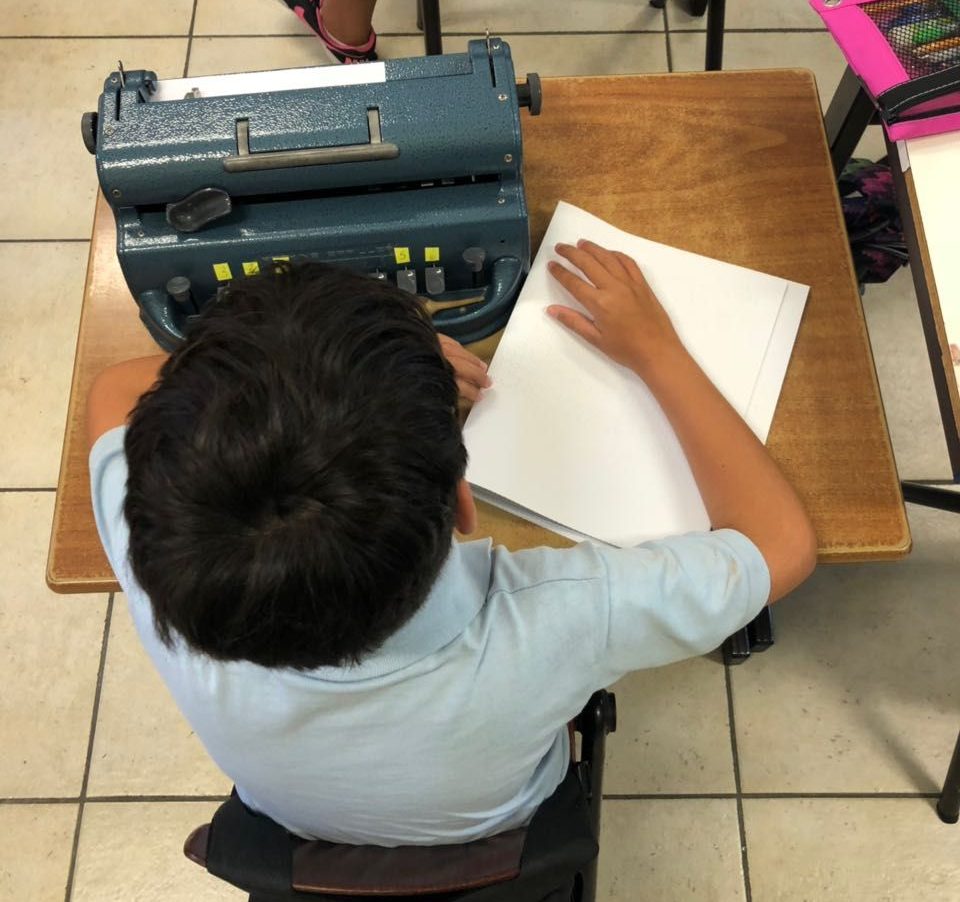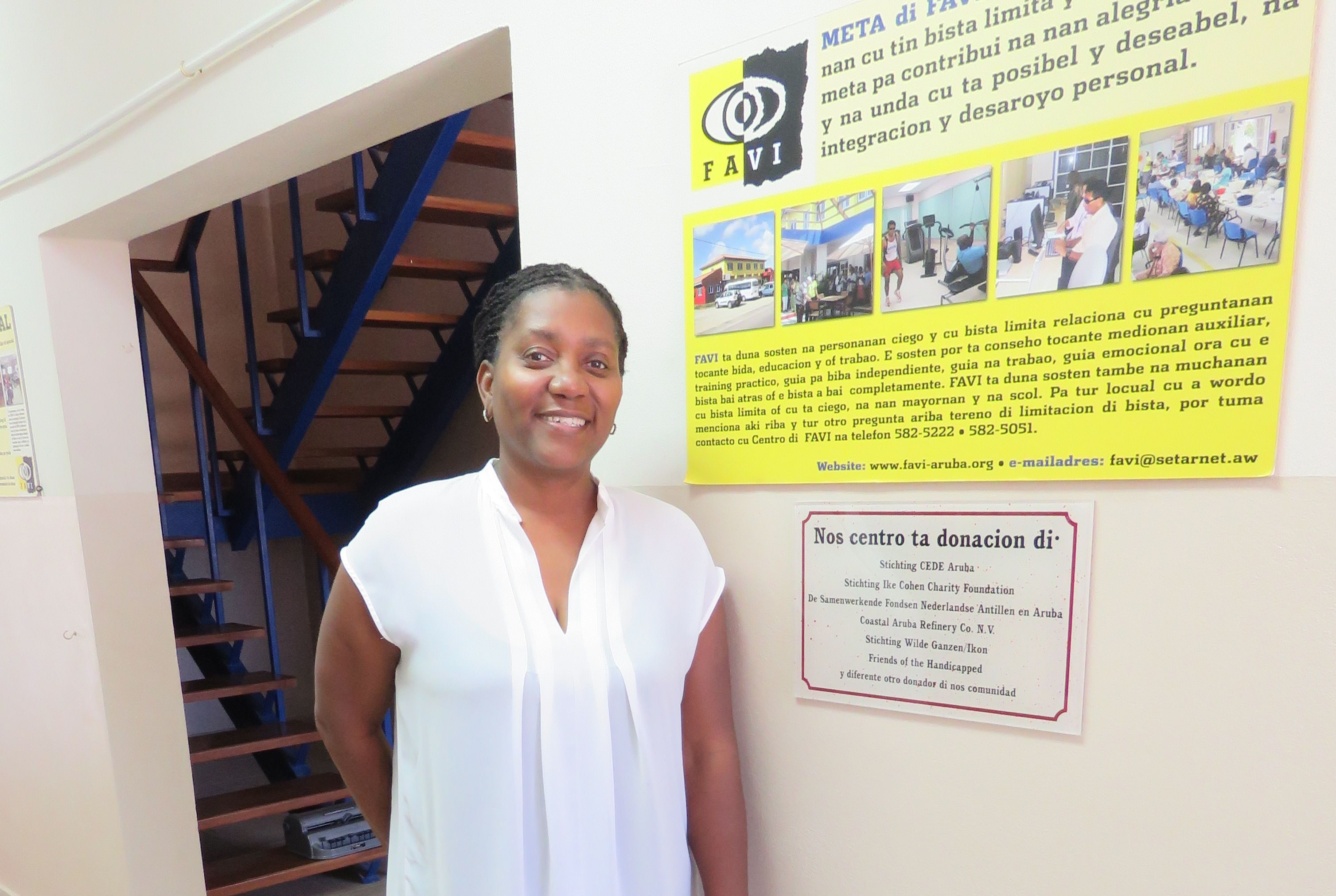This article is sponsored by: Ling & Sons Super Center
ORANJESTAD – In the year 1974 a group of enthusiastic people, stimulated by the Netherlands, founded the “Stichting Blindenzorg Aruba” foundation. In 1975 the name was changed to the Papiamento name “Fundacion Arubano di esnan Visualmente Incapacita,” abbreviated as FAVI, easily recognizable in the community. The name FAVI nowadays is directly linked to the visually impaired. Cetty Baarh, Director of the foundation: “FAVI is for the blind and visually impaired, we are the only one on the island that gives guidance to this group. The objective is to help and guide them with the main purpose to make them happy again. We focus first on happiness because when the person feels good about her or himself again after losing her or his sight, only then we can mean something to them. Only then they accept our help and if they do we concentrate on what they want and need.”
Reintegration into Society
Either the eye specialist or the client initiates to come to FAVI. Next they go to their home to see the situation and register their needs. “What do you want? How is your home situation? Do you have problems at your job? are some of the questions we ask. After that we do a practical visual check with a revalidation therapist. The test is not medical but for us to determine the person’s visual capacity. When a person has 30% or less they are considered a visually impaired person.” In general people with a vision above that, they are not accepted. However the exception is when their functional system is not working well, we need to set a guideline. FAVI has ten workers, the director, two teachers, bus drivers, receptionist, and cleaning lady among others. A revalidation therapist gives all trainings and operates the vision testing. She teaches patients how to work on the computer, typing and does Braille classes for clients and teachers as well.
It does not stop there, as the assistant at the school also has to teach Braille to the parents. There are information briefings to the police school and lectures within the community. The activity coordinator takes care of all social activities like trips to the beach or casino and bus trips, a Christmas celebration or a comedy show visit. The social workers visit the homes of the clients and organize conversational sessions as there are so many topics that the clients have issues with and in this group they talk and find solutions. “Depressions are common with our clients but this group helps them a lot, there is a way out. We focus on what they can still do and on acceptance. If you were able to see before and lose your sight it is really very difficult. When a child is born without sight mostly the parents have problems. We need to teach the child how the world appears and we paint that world. Their social behavior differs often from other children as their senses are more developed and they express in a different way which can cause misunderstandings.
 3, 105 Visually Impaired
3, 105 Visually Impaired
According to Census Aruba 2010 there are 3,105 visually impaired people. FAVI only has 350 clients, by percentage that is comparable to the Netherlands and Curacao. “They do not look for help easily. The reasons are the taboo, they are embarrassed to get out, do not want people to know and will try to ignore it, as long as manageable. Other factors are they do not wish to burden the family so they keep themselves isolated”, the director explains. The majority of the clients are visually impaired because of glaucoma or diabetes; for sure 80% of those illnesses are the cause and also age. A smaller group is born with the illness, like premature babies, babies with eye disease or born with cataracts. “Before the age range was 60 and up, but the clients are getting younger, so 50 and up is now applicable but a growing group are young people in their twenties. This is because of the unhealthy eating lifestyle so they get diabetes that can go hand-in-hand with losing sight.”
Reach Out
FAVI visits the doctors to underline the importance of referring clients to them. “We would like to reach everybody, we have the knowledge in-house and the professionals working here. We call on the community to be open to us, even if you do not have this problem yourself, you might know someone in your neighborhood, and friends, family and you help a lot to inform them about us to coax them out of isolation.
Needs
“We would love tourists to come and see our facility to see what we have to offer and interact with clients. Clients are always open to that, so call us and stop by. Every Wednesday we have gym class and we have other classes, it would be great to show you how we work and have you spread the word,” Baarh says. FAVI as a foundation receives a government subsidy, mainly to pay the workers and they have other funds from different donations. “We do activities to get funding and we have collectors. We can only run by that. We are in need of equipment and that is expensive, especially for the blind and visually impaired, like Braille type machines, printers etc. For example we have two blind children on the island that follow regular education completely in Braille, so they have their typing machine for Braille. But the technology is advancing and we need to be able to keep up to make sure these kids can proceed in the regular system.”
If you would like to visit the foundation, please call + (297) 582-5222 or 582-5051 and ask for Cetty Baarh. If you would like to donate, the bank account is RBC Bank 31 36 6122 or Arubabank 7024380290. For more information visit the website: http://www.favi-aruba.org/or Facebook: FAVI.
Thank You!

















